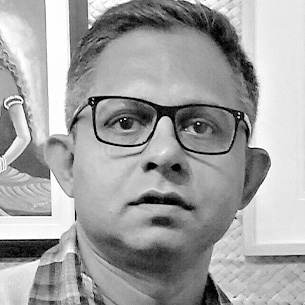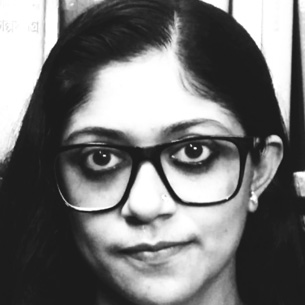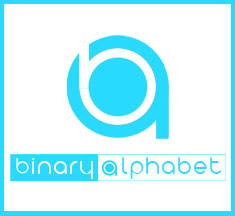
A self-taught cartoonist, Rituparno Basu has been doing comic strips, cartoons and illustrations for periodicals, books, adverts, newspapers, and state-funded outreach projects for more than a decade. His documentation work on illustrated humour is widely shared and appreciated in social media. He co-edits the periodical Bishoy Cartoon, which has unearthed lost histories of cartoonists, illustrators, and graphic artists of Bengal. As a member of Cartoon Dol – a cartoonists’ collective – Rituparno had helped to trace, archive and restore to public memory specimens of yesteryear humour. He also consults with various cartoon-based initiatives like Chota Mota Foundation, Comics and Graphics Magazine, the annual tabloid Cartoon Pattor etc. Basu is the author of Poriborton, a collection of political cartoons. Along with two other cartoonists, he has illustrated the pamphlet Protteke Amra Porer Tore (Each of Us for the Other, 2017), published by the Environment Department, Government of West Bengal, aimed at generating ecological awareness among school children. Basu’s cartoonesque take on the issue of global warming has earned a special jury mention at Maya Kamath Memorial Cartoon Competition, 2019 organized by the Indian Institute of Cartoonists, Bangalore. Basu is also associated with Kolkata Centre for Creativity, where he mentors youngsters keen to learn cartooning.

Sayandeb Chowdhury teaches in the School of Letters at Ambedkar University Delhi. His monograph Uttam Kumar: A Life in Cinema was recently published. He has written in scholarly journals and collections on colonial photography, cinema, and the city; and on books, politics, and culture for the cultural press in India and outside. He was a UKNA Fellow at International Institute of Asian Studies, Leiden in 2015, and a Charles Wallace UK Trust Fellow in 2016. The current project is part of his wider interest in the multiple modalities of visual modernism in Bengal. More about his work can be found at www.sayandeb.in.

Sangbida Lahiri has just submitted her Ph.D thesis at the Department of South and Southeast Asian Studies, University of Calcutta. Her thesis is on the history of political thought in youths and students in late colonial Bengal. Her other research interest is in ‘women as labour’ within a broader domain of minority and sexuality discourses in India. She has worked as a research fellow with Global India Foundation; as a project assistant in the School of Women’s Studies at Jadavpur University; and as a research assistant at Calcutta Research Group. She has published widely while working as a journalist in Ananda Bazar Patrika (ABP Group) and Ei Samay (TOI). She has also published with the journal Peace and Security Review and The Wire. She is also working as a research assistant in a long-term Carnegie Trust-funded Project led at the University of Glasgow, UK.

Grinning Tree is a design collective based in Kolkata, India but available anywhere in the world. It designs through discourse, using narratives present in a culture that become the heart of the creatives they make. Grinning Tree is equipped to handle projects and collaborations that cross multiple mediums and believe in pinning projects within a framework of meaning and symbols. It likes interesting and challenging projects. Grinning Tree Production is a refuge for freelancers and free thinkers. It is quite proud of its evolution and for the fact that it has been able to hold to its own in the increasingly mundane bombardment of visuals that pass by without leaving any impact. The team of Shamik Chatterjee and Antara Choudhury of Grinning Tree designed the website for the project keeping in mind both the need of the research team as well as it being a public history project that must be attractive for the public.

Binary Alphabet Pvt. Ltd. is a digital start-up specializing in user experience design and web and mobile application development. It is based out of Kolkata, India, and services clients all over the globe. The goal of the company is to transform client ideas into reality and build excellent digital content, while also keeping in mind time and budget constraints if any. Led by Aadesh Mahato, who did his Masters in Computer Application from NIT Durgapur, the team is pushing boundaries in technology trends with a client-first culture.
The team would like to wholeheartedly thank Mr Anirban Banerjee, Sr Executive at the New York-headquartered global technology company Avanade for his pursuit, suggestions, and solutions towards building this comprehensive public history website on a competitive budget. His dedication to this project has been a pillar of unwavering support for the team.
Huge thanks are also due to Prof Shubhendu Dasgupta, retired faculty of the University of Calcutta, for his pioneering efforts in putting together a history of political cartoons and his generous help in making use of them. Rituparno would like to thank cartoon collector and archivist Bishwadeb Gangopadhyay, editor of Bishoy Cartoon magazine for his invaluable help in accessing long-lost and rare illustrations. He would also like to thank cartoonist and author Debashish Deb and publisher Shantanu Ghosh. Critical help also came from Swagata Dutta Burman an independent comics researcher, who has authored books on comics and is currently working on a history of Bengali cartoons.
Thanks are also due to the organizers of the Graphic Storytelling in India Conference, held in 2018 under the aegis of KNMA, Delhi, and AUD, where the conversation started. A special thanks in this regard is due to Abeer Gupta, visual anthropologist and art curator. Finally, the project is indebted to Ambedkar University Delhi and in particular Prof Geetha Venkatraman, Dean of Research and Consultancy, for the Seed Money Grant with which the research could be undertaken and website built.